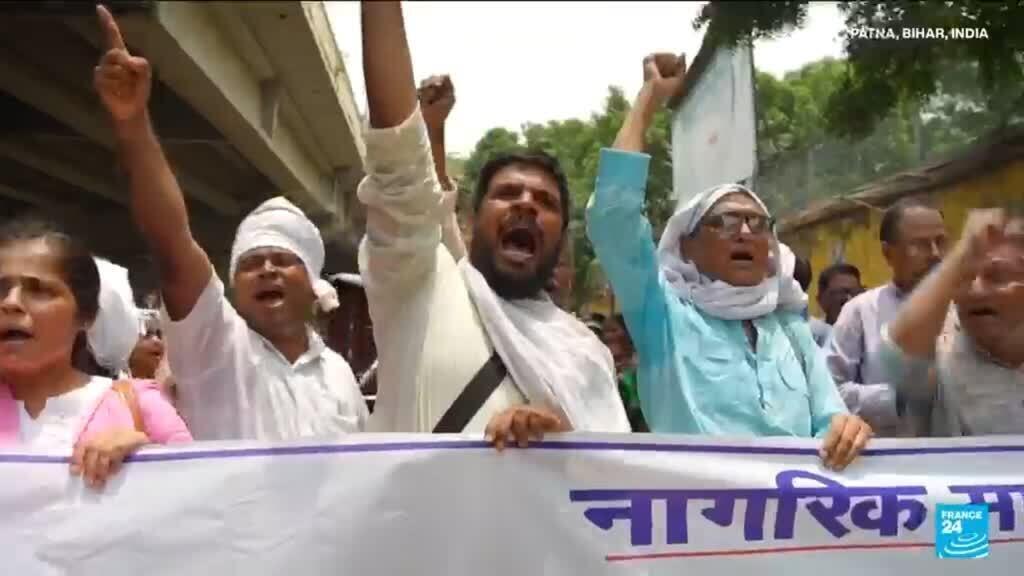Politics
Bihar State Electoral Commission Rushes Voter Roll Revision

The Electoral Commission of India’s Bihar state has completed a fast-tracked revision of its voter rolls, prompting concerns over potential disenfranchisement for millions of residents. The commission mandated that citizens provide documentation to verify their identity, a requirement that critics argue disproportionately affects the underprivileged population of Bihar, where only 2 percent of individuals possess passports and approximately one-third of births remain unregistered.
The revision, which was initiated without extensive public consultation, aims to update the electoral rolls ahead of upcoming elections. However, experts and local activists warn that the criteria set by the commission could leave a significant portion of the electorate unable to vote.
Concerns Over Accessibility and Equity
Bihar is known as the poorest state in India, with a high percentage of its population facing economic challenges. The requirement for citizenship documentation raises critical questions regarding accessibility to voting rights. Many residents lack the necessary paperwork, which could lead to widespread disenfranchisement.
Local activist groups have expressed their alarm over these developments. According to reports by journalists Navodita Kumari, Nabeel Ahmed, and Theo Prouvost Mauze, the push for documentation has sparked protests and calls for the electoral body to reconsider its approach. Activists argue that the revision process should prioritize inclusivity and ensure that all eligible voters can participate in the democratic process.
The Electoral Commission has defended its actions, stating that the revisions are necessary to maintain the integrity of the electoral system. They assert that the verification process aims to eliminate fraud and ensure that only eligible voters are included in the rolls.
A Broader Context of Voter Rights in India
The situation in Bihar highlights a larger issue regarding voter rights across India. Similar controversies have arisen in other states where stringent documentation requirements have led to fears of disenfranchisement among vulnerable populations. The importance of comprehensive birth registration and accessible identification systems cannot be overstated, especially in a nation where many citizens face systemic barriers.
As Bihar prepares for its elections, the focus will likely remain on the implications of this voter roll revision. The need for a more equitable electoral process resonates beyond the state, calling attention to the fundamental principles of democracy and representation.
In the coming weeks, as the electoral landscape evolves, the response from both government officials and the public will be pivotal in shaping the future of voting rights in Bihar and beyond.
-

 Business5 months ago
Business5 months agoKenvue Dismisses CEO Thibaut Mongon as Strategic Review Advances
-

 Lifestyle4 months ago
Lifestyle4 months agoHumanism Camp Engages 250 Youths in Summer Fest 2025
-

 Sports4 months ago
Sports4 months agoDe Minaur Triumphs at Washington Open After Thrilling Comeback
-

 Sports5 months ago
Sports5 months agoTupou and Daugunu Join First Nations Squad for Lions Clash
-

 Top Stories5 months ago
Top Stories5 months agoColombian Senator Miguel Uribe Shows Signs of Recovery After Attack
-

 World5 months ago
World5 months agoASEAN Gears Up for Historic Joint Meeting of Foreign and Economic Ministers
-

 Health4 months ago
Health4 months agoNew Study Challenges Assumptions About Aging and Inflammation
-

 Business5 months ago
Business5 months agoOil Prices Surge Following New EU Sanctions on Russia
-

 Entertainment4 months ago
Entertainment4 months agoDetaşe-Sabah Violin Ensemble Captivates at Gabala Music Festival
-

 Entertainment4 months ago
Entertainment4 months agoBaku Metro Extends Hours for Justin Timberlake Concert
-

 Top Stories5 months ago
Top Stories5 months agoRethinking Singapore’s F&B Regulations Amid Business Closures
-

 Business5 months ago
Business5 months agoU.S. House Approves Stablecoin Bill, Sends to Trump for Signature









